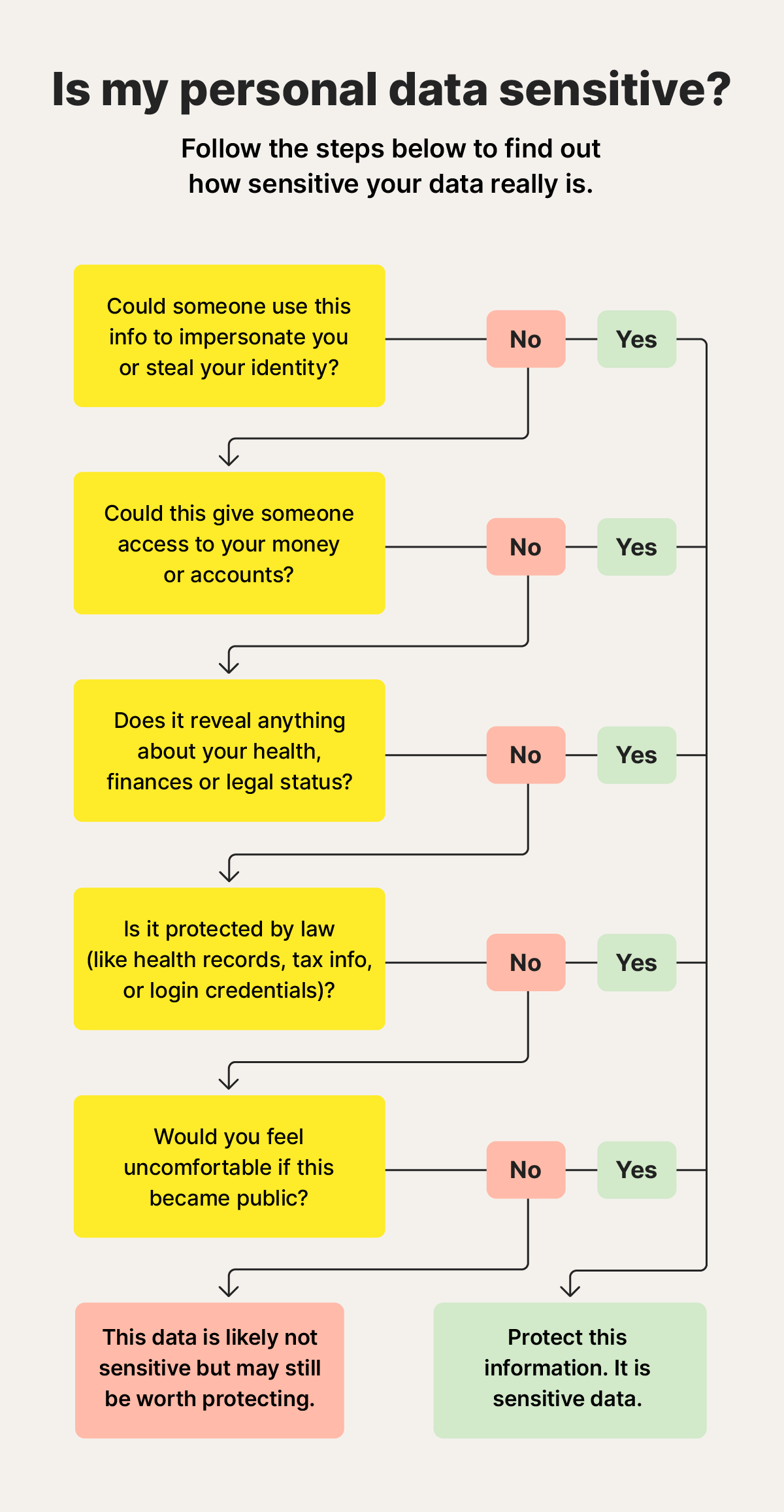Everyone has sensitive information that, if exposed, could put their identity or financial well-being at risk. And, unfortunately, this data is often stolen from businesses entrusted to protect it. In 2024, there were over 3,000 publicly reported data compromises in the U.S, potentially leaving millions of pieces of sensitive data in the hands of cybercriminals.
However, data breaches aren’t the only way sensitive information can be exposed. You may also be at risk if you lose your wallet, connect to an unsecured wireless network, or fall for a phishing scam. Keep reading to learn what sensitive data is and how to protect yours.
What is sensitive data?
Sensitive data is personal or confidential information that, if exposed or misused, can lead to harm like identity theft or financial loss. Specific examples of sensitive data include your Social Security number, bank account details, medical records, and online account credentials.
Cybercriminals often target this data because they can use it for fraud, unauthorized account access, or exploitation. That means it’s important to put extra safeguards in place to keep it from falling into the wrong hands.
Types of sensitive data
Sensitive data comes in many forms, including personally identifiable information and financial, health, and business data. Understanding the different types can help you build better strategies to protect them.
Personally identifiable information
Personally identifiable information (PII) refers to any data that can be used to identify you, like your name, Social Security number, or email address. Since all PII is directly tied to your identity, it’s a common target for identity thieves and other fraudsters. However, some types are more sensitive than others, requiring additional protection to prevent misuse.
Examples of particularly sensitive PII include:
- Driver’s license number: Your driver’s license number is a state-issued ID. If a criminal steals your driver’s license number, they could impersonate you or access services in your name.
- Social Security number (SSN): Your SSN is a government-issued identifier used for taxes, credit, and employment. If you lose your Social Security card or your SSN falls into the wrong hands, criminals could commit identity theft and open unauthorized accounts in your name.
- Passport number: Your passport number is linked to your identity and citizenship. Criminals could forge travel documents or impersonate you if you lose your passport.
Financial data
Financial data refers to information tied to your financial accounts, transactions, and history. It’s valuable to cybercriminals because they can use it to access your funds, make unauthorized purchases, or commit fraud.
Examples of financial data include:
- Credit card numbers: Criminals who steal your credit card number may be able to make unauthorized online purchases.
- Bank account details: Fraudsters with access to your bank account number and routing number may be able to access your funds or initiate unauthorized transactions.
- Tax filings: Tax return documents contain personal and financial information like your income, deductions, and Social Security number. Criminals can use this data to file false returns, access government benefits, or apply for loans in your name.
Health data
Health data includes information like your medical history, insurance details, and health status. There are strict regulations in place to protect health data but it can still be compromised in data breaches or through mail theft, allowing criminals to use it in fraud or scams.
Examples of sensitive health data include:
- Medical records: Criminals could access your medical history, including diagnoses, treatments, and medications, to target you with scams.
- Lab results: Test results, including bloodwork and diagnostic reports, can reveal private health conditions and be exploited for fraud.
- Health insurance details: Criminals can use your insurance policy numbers and coverage information to make fraudulent claims or access benefits in your name.
- Billing information: Billing details related to your medical treatments and insurance claims can be stolen and used for unauthorized transactions or to gain access to healthcare services.
A recent example of health data vulnerabilities arose with the bankruptcy of 23andMe, which raised concerns about the security of the genetic data of its 15 million customers. The company’s data, including DNA and personal details, could be sold to the highest bidder, putting sensitive health information at risk and opening the door to fraud.
Experts warn that if this data falls into the wrong hands, criminals may exploit it to craft convincing scams targeting 23andMe users. Scammers could use personal details, such as genetic traits, family connections, or health risks, to make the messages they use in fraudulent schemes appear more relevant and credible.
Business data
Business data refers to sensitive information about a company’s operations, assets, employees, and customers. If this data is compromised, it could expose personal information, financial records, or other private details, putting both customers and employees at risk of fraud, identity theft, or privacy violations.
Examples of business data include:
- Customer information: Criminals can use customer data such as names, addresses, purchase history, and payment details to commit fraud or send targeted phishing emails impersonating a company.
- Employee information: Criminals can use employees' personal details, such as Social Security numbers, salaries, and health information, to commit identity theft.
- Partner contracts: Unscrupulous businesses, or individual bad actors within them, could exploit information exposed from confidential agreements and contracts with business partners for a competitive advantage or to run tailored scams.
- Intellectual property: Patents, trademarks, trade secrets, and proprietary information give companies a competitive edge. Unethical competitors or cybercriminals could steal and use this information to harm a business.
Sensitive data vs. personal data
Personal data is information like your name, address, or phone number that can identify you, either wholly or in part. Sensitive data is information that could cause serious harm if exposed, like your financial details or health records.
Not all personal data is sensitive, but all sensitive data is personal. Personal data that’s also sensitive is often called private data and requires extra protection compared to basic personal data like your name.
Sensitive data |
Personal data |
|
|---|---|---|
Definition |
Information that could cause significant harm if exposed. |
Information that can identify you. |
Examples |
SSN, credit card number, bank account details, and health insurance information. |
Name, address, phone number, and job title. |
Is this information public? |
No. |
Sometimes. |
How to know if personal data is sensitive
Not all personal information needs the same level of protection, but some details are more valuable to criminals than others. Fundamentally, personal data should be considered sensitive if someone could feasibly use it to commit fraud or steal your identity.
To figure out if a piece of data is sensitive, consider the risks if it were exposed. Ask yourself the questions below to help assess how much protection that data needs.


Impact of sensitive data exposure
The consequences of your sensitive data being exposed in a data breach, data leak, or personal incident like theft could be costly. Depending on the type of data that falls into the wrong hands, you may be vulnerable to targeted scams, account takeover attacks, financial losses, or even identity theft.
These consequences may not always be visible in the immediate aftermath of your data being stolen, either. For example, it wasn’t until three months after a cyberattack on Watsonville Community Hospital that around 20 employees discovered there were fraudulent tax returns filed in their names. One employee found she had an $8,000 refund flagged by the IRS.
How to protect sensitive data
Taking a few simple precautions can go a long way in protecting your data. Here are a few precautions you can take to help keep your information secure.
- Use identity theft protection services: Services like LifeLock monitor your information on the internet and the dark web, so you can take action to improve your online privacy. LifeLock also provides alerts of suspicious activity involving your sensitive data, including your SSN, notifying you of potential fraud.
- Create strong, unique passwords: Strong passwords that are at least 15 characters long, made up of a mix of letters, numbers, and symbols, and completely unique to each account can help protect you against account takeovers.
- Turn on two-factor authentication (2FA): For an added layer of security, turn on two-factor authentication wherever possible. This will help prevent anyone with access to your password from accessing your online account.
- Avoid clicking suspicious links: If you receive a suspicious text, email, or social media message from an unknown source, don't open it or click any links. It's likely a phishing scam designed to get you to reveal sensitive information.
- Only connect to secure networks: Prioritize trusted, password-protected Wi-Fi networks. Avoid using public Wi-Fi when entering sensitive information or making transactions, as it could expose your data to hackers.
- Use a VPN: Enabling a virtual private network (VPN) while you browse the web encrypts your internet connection, providing an extra layer of protection that can help keep your personal information safe from hackers.
Data protection laws
Data protection laws are regulations designed to safeguard your personal information and ensure it’s collected, stored, and used responsibly. These laws aim to hold organizations accountable for protecting your personal information.
Some important data privacy laws include:
- California Consumer Privacy Act (CCPA): CCPA gives California residents the right to know what personal data is being collected, request deletion of their data, and opt out of the sale of their information. It applies to certain businesses that meet specific revenue or data processing thresholds.
- Health Insurance Portability and Accountability Act (HIPAA): Focused on health data in the U.S., HIPAA sets standards for protecting medical records and personal health information. It applies to healthcare providers, insurers, and any entity that handles health data.
- Children’s Online Privacy Protection Act (COPPA): COPPA protects the privacy of children under 13 by requiring parental consent before collecting personal information from them online. It applies to websites and online services targeting young users.
- Personal Information Protection and Electronic Documents Act (PIPEDA): PIPEDA is a Canadian law that governs how private-sector organizations collect, use, and disclose personal information. It emphasizes transparency, consent, and the right to access and correct personal data.
- General Data Protection Regulation (GDPR): Enforced in the European Union, GDPR sets strict rules on how personal data must be handled, including requirements for user consent and the right to access or delete data. It applies to any organization processing data of EU residents, regardless of where the organization is based.
Protect your sensitive data with LifeLock
Protecting your sensitive data starts with understanding what information is most at risk and how to secure it. LifeLock adds an extra layer of protection by monitoring for your data on public people search sites and the dark web, giving you the information you need to boost your privacy. And if you fall victim to identity theft, we can help you restore your identity easier than you could alone.
FAQs
What is data privacy?
Data privacy refers to the right to control how your personal information is collected, used, and shared. Data privacy laws are supposed to ensure your data is handled responsibly and kept secure.
What is the difference between confidential and sensitive data?
Confidential data is information intended to remain private within an organization, such as business plans or proprietary information. Sensitive data includes personal details, such as Social Security numbers or health records, that could cause harm if exposed.
How do businesses protect my sensitive data?
Businesses protect sensitive data using encryption, secure servers, access controls, and regular security audits. Many also follow data protection laws and industry standards to ensure your information is handled safely.
Editor’s note: Our articles provide educational information. LifeLock offerings may not cover or protect against every type of crime, fraud, or threat we write about.
Start your protection,
enroll in minutes.
LifeLock is part of Gen – a global company with a family of trusted brands.
Copyright © 2026 Gen Digital Inc. All rights reserved. Gen trademarks or registered trademarks are property of Gen Digital Inc. or its affiliates. Firefox is a trademark of Mozilla Foundation. Android, Google Chrome, Google Play and the Google Play logo are trademarks of Google, LLC. Mac, iPhone, iPad, Apple and the Apple logo are trademarks of Apple Inc., registered in the U.S. and other countries. App Store is a service mark of Apple Inc. Alexa and all related logos are trademarks of Amazon.com, Inc. or its affiliates. Microsoft and the Window logo are trademarks of Microsoft Corporation in the U.S. and other countries. The Android robot is reproduced or modified from work created and shared by Google and used according to terms described in the Creative Commons 3.0 Attribution License. Other names may be trademarks of their respective owners.







![How to remove your information from the internet [11 free ways]](/content/dam/lifelock/learn/thumbnails/remove-personal-information-from-the-internet-thumb-2025.jpg)